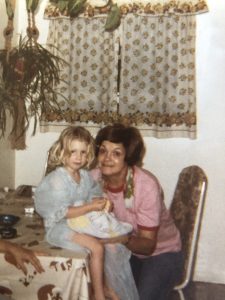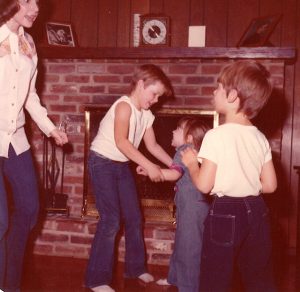By: Cera Meintzer and Danielle Palli
Cera’s Personal Connection to Music
As my brain was swimming through ideas for this article, I took a moment to check on my five-year-old daughter only to find her laying on her bed, headphones plugged into the karaoke machine. Her eyes were tightly closed, and she was singing “let it go, let it go” at the top of her lungs (completely clueless that I was watching her). An iconic song from the film Frozen and one that millions of girls born in the 2000s mark their youth. It reminded me that just like any film these days, our lives have a soundtrack. I can think back to each stage of life and immediately come up with the musical artists or songs that influenced my life and the people with whom I shared those times.
Here is one of those times…

In my late teens, I lost my maternal grandmother, Granny, as I called her. She was a second mother to me, and I was hit hard by her death. I was a college freshman at the time and had a minor role in the theater production of Grapes of Wrath. Granny’s services took place in another state on the same day as one of the shows. This required me to travel out of state and back on the same day so that I could be a part of both events.
My family had hired several bagpipers to play at her services and they played many songs but the one that still echoes in my mind and heart is Amazing Grace. It was the very song I had to sing on-stage that night with tears running down my face as we closed the production that night. To this day it brings me to tears and reminds me of how much I love Granny.
The Emotional and Social Side of Music
Listening to, and making music, connects us to emotions and memories in the same way as our other senses do. Think about a smell that takes you back to a specific time and place. Music is a human right, a modality essential to living a full, creative, and connected life. A right that punctuates history and spans cultures. It’s an organic part of the natural world which we humans are part of, even if we have removed ourselves and forgotten, to a large extent, our natural connections.
Music also supports successful living and the S.I.P.S. of wellness, which are the Spiritual, Intellectual, Physical, and Social components of wellful living. Consider how music plays into each of these pillars of your life now and throughout your lifespan.
The Benefits of a Musical Life
While most people acknowledge that music can boost your mood and help you tap into meaningful times in your life, integrating a variety of music into your playlist has some additional, and pretty profound benefits, to include:
- Enhanced reading and language skills
- Greater emotional awareness of others and emotional self-regulation
- Increased intelligence
- Enhanced memory and autobiographical memory retrieval
- Better focus and attention
- Reduced stress and anxiety and greater wellbeing
- Pain relief and faster recovery from injury
- Enhanced immune function
- Better motor skills and fluidity of movement
- Enhanced neural plasticity in undamaged regions of the brain
- Advanced problem-solving abilities (particularly in those who play an instrument)
- Increased creativity
On a standardized IQ test, children who received six months of musical training in rhythm, melody, and harmony demonstrated a greater increase in IQ score than those who had not in one study. In older patients undergoing total hip joint replacement, another study showed that those who listened to music before and during surgery produced 20% less cortisol (a stress hormone), and required 15% less anesthesia than those who listened to relaxing sounds, such as ocean waves. Research done on stroke patients demonstrated greater neural plasticity surrounding damaged areas of the brain, leading to significant recovery of verbal memory and focused attention. And, people with Parkinson’s disease (who have trouble with complex motor control) have been observed in clinical environments to move more fluidly when listening to music. *
With benefits such as these, it’s no wonder that music is so prominent across every culture around the globe.
Danielle’s Personal Connection to Music
According to my mother, I used to kick to the beat of whatever music she was playing while I was still in utero. Based on current studies of music and infants, there’s a good chance that this observation was not entirely accurate, but … let’s go with that. It’s a nice memory.
 One of my favorite activities we did as a family growing up was simply dancing around the living room. My parents taught us the basics of the Jitterbug, Cha-Cha, Mambo, and a Waltz Box Step, (informal lessons that I would later inflict on unsuspecting boyfriends). We were also exposed to a variety of music across many genres and decades and encouraged to find our unique way to move. To this day, I cannot listen to Nat King Cole, Harry Belafonte, Sam Cooke, or a myriad of other singers without thinking of that time in the living room.
One of my favorite activities we did as a family growing up was simply dancing around the living room. My parents taught us the basics of the Jitterbug, Cha-Cha, Mambo, and a Waltz Box Step, (informal lessons that I would later inflict on unsuspecting boyfriends). We were also exposed to a variety of music across many genres and decades and encouraged to find our unique way to move. To this day, I cannot listen to Nat King Cole, Harry Belafonte, Sam Cooke, or a myriad of other singers without thinking of that time in the living room.
Today, I integrate music into many areas of my life. I may listen to binaural beats or new age music when meditating or doing yoga; ambient or classical music when writing; or a variety of up-tempo pop, Broadway, Indie and folk music when I feel like randomly putting on a musical dance number for my pets. And, playing the piano and singing has become a great outlet for me during times of stress (It doesn’t matter that I’m terrible at patting my head while rubbing my belly at the same time. Fortunately, skill level is not a deal-breaker when it comes to musical benefits). I’ve even taken to learning the rudimentary beginnings of composing the unique melodies that are playing in my head, putting notes to music paper.
My wish for you, the reader? Discover how music appreciation can make a profound difference in your life.
Tips for Inviting More Music into Your Life
- Explore music from other countries. It may take time for our brains to respond to new rhythms, pitches, and timbres, so try it for a week and see what happens.
- Ask for music recommendations from friends that are outside of your normal genre. You may think you don’t like something, but they may have insight into a subgenre that you will And again, it may take time to develop a taste for something new.
- Notice where music in your life is present, and where it’s not. How does it change your experience? (e.g. Music that is present or absent from a restaurant. Is it live or recorded? Does that change the experience?)
- What instruments are most appealing to you? Consider learning to play.
- Try out some of these groovy music apps and streaming stations:
- Spotify/Pandora/Apple/Google Music – all generas
- FM – electronic music
- Idagi0o – classical
- Shazam – Discover what’s playing around you and then save the song.
Questions to consider…
- How and when does music show up in your life?
- Do you appreciate music differently when you are listening vs. singing, dancing or playing an instrument?
- Do you prefer to experience music alone or with a group or a band?
- Who are the musicians who inspire you?
- How does music make you feel? (And, do you change the type of music you appreciate based on mood or activity?)
Read Part 3 of this series: Dear Diary (The Benefits of Journaling and the Lost Art of Letter Writing).
****
This article was originally published June 17, 2020.
Note: We encourage readers to share Masterpiece content. However, please see our guidelines for attribution
* All of these studies can be found in greater detail in the Great Course, Music and the Brain.
